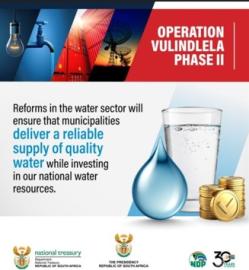
President Cyril Ramaphosa has assured South Africans that Phase Two of Operation Vulindlela will tackle the country’s worsening water crisis, while deepening reforms already underway.
The second phase of Operation Vulindlela launched by President Ramaphosa on Wednesday, will not only prioritise new areas for implementation, but also deepen the implementation of current reforms.
He emphasised that the immediate priority is to follow through on those reforms that are already underway to realise their full impact.
On water reform, President Ramaphosa said government will establish the National Water Resources Infrastructure Agency as a dedicated entity to own, manage and invest in the country’s water resources.
Through the Water Partnerships Office, government will support public-private partnerships in water infrastructure to reduce leaks, access new water sources, and improve wastewater treatment.
“To address the root causes of service delivery failures, we will amend the Water Services Act to separate the role of municipalities as water service authorities and water service providers.
“The days of standing by and watching while taps run dry or raw sewage runs into our rivers are over. We will take action to make sure that right of every South African to quality drinking water is protected,” he said.
Visa System
On the visa system, the President said government will ensure that the recommendations of the work visa review are fully implemented and introduce an Electronic Travel Authorisation System to support growth in tourism.
The Minister of Home Affairs has already introduced the points-based system to make it easier for highly skilled immigrants to come to South Africa and contribute to the country's economy, while at the same time enforcing immigration laws more effectively to combat illegal immigration.
“Through these measures, we will complete the reform of our network industries that we began in the previous phase and address the binding constraints on growth,” President Ramaphosa said.
The President acknowledged that while phase one of the programme has made meaningful progress, which will enable higher growth in the years to come, the economy continues to be held back by structural inefficiencies.
“Our economy needs to grow much faster to create the jobs that we need and to achieve prosperity for all. We need more rapid growth to enable government to spend more on healthcare, education, social grants, infrastructure and other key areas to improve the lives of our people. Growth is the only way to achieve fiscal sustainability and social progress,” he said.
The President said this is why the Government of National Unity (GNU) is committed to sustaining the momentum achieved by Operation Vulindlela on the economic reform agenda.
He emphasised the need for bold, far-reaching reform to revive and reshape the economy.
Energy sector
In the energy sector, government will establish a competitive electricity market governed by the Electricity Regulation Amendment Act, which came into effect earlier this year.
“This will enable multiple generators to compete to produce electricity at the lowest cost and with the greatest efficiency.
“To support this, we will complete the restructuring of Eskom and establish an independent Transmission System Operator to create a level playing field for market competition,” he said.
To address the lack of grid capacity, the Minister of Electricity and Energy has launched the first round of Independent Transmission Projects to procure more than 1 000 km of new transmission lines.
These reforms will ultimately mean lower costs and a reliable electricity supply for all South Africans.
Logistics sector
In the logistics sector, private rail companies will soon be able to operate on the freight rail network, following the publication of the Network Statement by Transnet in December last year.
This will enable massive investment in rolling stock and enable more goods to be transported by rail, helping the country's export industries to grow.
“These reforms will generate significant capital and new revenue streams for Transnet to help stabilise its operations and enable it to invest,” the President said.
The implementation of the Freight Logistics Roadmap will continue in phase two, including the vertical separation of infrastructure and operations for both rail and ports, which will enable competition in operations and encourage private sector participation. – SAnews.gov.za


